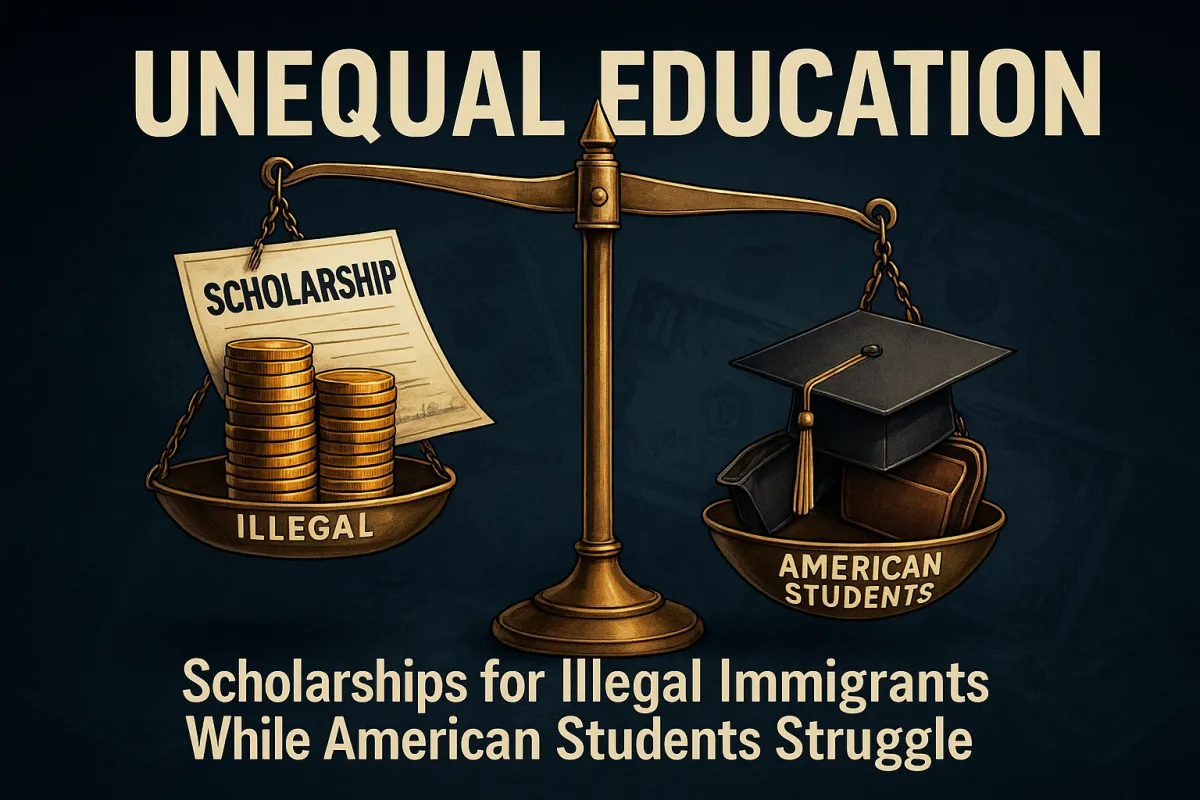
RECKONING
A House Divided by Tuition: Illinois Faces Federal Reckoning Over Scholarships for Illegal Immigrants
Justice Department lawsuit collides with Pritzker’s sanctuary-state agenda, while Rep. Deering fights to restore fairness for American students
By Staff Writer
September 5, 2025
“Illinois can’t tilt the playing field toward illegal immigrants. My bill restores equal treatment, so no illegal immigrant gets a better deal than any American student, period.”
— Rep. Regan Deering
Federal Lawsuit Challenges Illinois Tuition Policies
On September 2, the U.S. Department of Justice filed a lawsuit against Illinois, charging that state laws granting in-state tuition and state-funded scholarships to illegal immigrants are unconstitutional.
The DOJ complaint argues the laws violate the Supremacy Clause of the U.S. Constitution and directly conflict with federal requirements prohibiting states from extending benefits to illegal immigrants that are not equally available to U.S. citizens.
“Under federal law, schools cannot provide benefits to illegal aliens that they do not provide to U.S. citizens,” said Attorney General Pamela Bondi. “Illinois now joins the list of states where we are relentlessly fighting to vindicate federal law.”
Rising Costs for Illinois Families
The financial realities behind the lawsuit sharpen the dispute:
Average in-state tuition at Illinois public colleges (2025): $13,395 annually
Out-of-state tuition: $19,475 annually
Estimated full cost of attendance: as high as $33,000 per year
At the same time, state funding for higher education has been cut nearly 50% since 2000, forcing families to shoulder more of the burden. Yet under Illinois law, students in the country illegally qualify for the same in-state tuition rates and scholarships unavailable to out-of-state U.S. citizens.
U.S. Attorney Steven D. Weinhoeft condemned the policy:
“Illinois has an apparent desire to win a ‘race to the bottom’ as the country’s leading sanctuary state. This policy treats illegal aliens better than U.S. citizens living in other states and incentivizes even more illegal immigration, all on the taxpayer’s dime. Illinois citizens deserve better.”
Legislative Push for Reform
Rep. Regan Deering (R-Decatur) introduced House Bill 4097 one week before the DOJ action, seeking to end what she calls preferential treatment for illegal immigrants.
“Yesterday’s DOJ action underscores exactly why I filed HB 4097,” Deering said. “College costs are high, aid dollars are limited, and families expect their tax dollars to be used fairly. My bill restores equal treatment, so no illegal immigrant gets a better deal than any American student, period.”
Her bill would amend the Public Higher Education Act and related statutes to ensure that benefits are tied to citizenship status, not unlawful residence.
Human Impact and Public Outrage
For many families, the issue is not abstract policy but a lived financial struggle.
“My daughter is drowning in debt, and the state is giving her scholarship away to someone who isn’t even supposed to be here.” — Springfield parent
Stories like this echo across Illinois: working-class parents watching their children take on crushing debt while illegal immigrants receive benefits on equal or better terms.
Historical Precedents in Other States
Illinois’ battle follows decades of conflict in other states:
California, 1994: Proposition 187 attempted to deny public benefits, including education, to illegal immigrants. Courts later struck it down.
Arizona, 2006: Proposition 300 barred illegal immigrants from receiving in-state tuition and financial aid. The law still stands.
Texas: Long allowed in-state tuition for illegal immigrants, sparking ongoing controversy and repeated repeal attempts.
Illinois differs in one crucial respect: its legislature expanded benefits, daring federal authorities to challenge the policy. The DOJ lawsuit now represents the most serious federal response in decades.
Voices From Across the Country
California — A Mother’s Anger
“My son joined the Marines to pay for college, and yet our state wanted to give tuition breaks to people who broke the law to get here. It never felt right.”
Arizona — A Father’s Bitterness
“I had neighbors celebrating their kids’ scholarships while my daughter had to move out of state and pay full freight. The message was: citizenship doesn’t count for much.”
Texas — A Student’s Unease
“I sat in a classroom where half of us were U.S. citizens and half were undocumented. … I couldn’t tell who my state was standing up for.”
These voices illustrate that Illinois is not alone. The question of tuition fairness has stirred anger in communities nationwide.
National Implications
Two Trump-era executive orders — “Ending Taxpayer Subsidization of Open Borders” and “Protecting American Communities From Criminal Aliens” — provide the legal foundation for the DOJ’s action.
If Illinois loses, other states offering in-state tuition to illegal immigrants could face similar lawsuits. If Illinois prevails, it may embolden sanctuary states to continue prioritizing non-citizens over citizens in access to taxpayer-funded education.
The Core Question
Rep. Deering calls for bipartisan support:
“If you believe in equal treatment for American students, I urge my colleagues on both sides of the aisle to support HB 4097, so Illinois is aligned with federal law and basic fairness and common sense.”
At its heart, this battle raises one unavoidable question:
“Should an American citizen ever stand second in line to an illegal immigrant for taxpayer-funded opportunity?”
The outcome will define not only Illinois’ future but also whether the nation still honors the promise of citizenship.
Sources:
U.S. Department of Justice, Office of Public Affairs, Sept. 2, 2025 Press Release
U.S. Attorney Steven D. Weinhoeft, Southern District of Illinois, Sept. 2, 2025
Statement from Illinois Rep. Regan Deering, Sept. 3, 2025
California Proposition 187 (1994), historical court records
Arizona Proposition 300 (2006), state education statutes
Tuition and funding data: CollegeTuitionCompare (2025), Axios Chicago (2023, 2024), NILC (2024)

